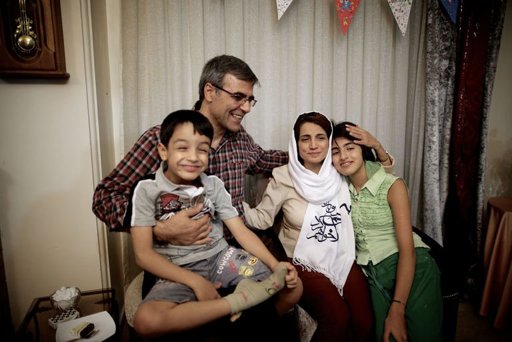
September 27-2013
by Warren L. Nelson
With no advance notice at all, the regime has loosened the screws by quietly freeing 15 political prisoners, including Nasrin Sotoudeh, the poster girl for all political prisoners.
No one knows how broadly or deeply the change will go, but there is clearly a shift in policy stemming from the June presidential elections.
Last Wednesday night, the wardens from Evin prison drove Nasrin Sotoudeh to her home for one of her occasional furloughs. When they dropped her off, they told her they would not be coming back for her. She was free!
Altogether, 15 political prisoners who had been jailed since the 2009 post-election protests were freed last week and an additional number—less than 80— are slated for freedom as Supreme Leader Ali Khamenehi has now signed their pardon papers.
The releases are the single most important development to come as a result of the election in June of Hassan Rohani as president.
Rohani himself has no authority to pardon anyone. That order has to come from Khamenehi. So the releases telegraph concretely that Khamenehi sees the election outcome as demanding a serious policy change.
The big question following the election was how Khamenehi would interpret the vote—would he see it as a wish for changes that he must resist to preserve the state, or would he see it as a clarion call that the Islamic Republic must change if it is to have any hope of surviving.
He has made many noises of loosening up on foreign policy and accepting nuclear talks with Washington, although with no expectation of success. Some have even suggested he wants talks so they can fail, and he can say he was right all along.
But the opening of prison doors puts a whole new light on Khamenehi’s interpretation of the vote. It signals, with little reason to doubt, that he is prepared to loosen up and accept more tolerance of opposition. But it does not say how far he is prepared to go. Censorship, for example, has not been modified at all, as is visible every day in the media. And enforcement of the dress code has resumed after four months of little enforcement.
Still, the question is no longer whether Khamenehi will loosen state controls, but how far he is prepared to loosen them. There is little doubt that he is looking over his shoulder at the hardliners in the Pasdaran and—especially—in the clergy. Over the years, he has been most responsive to the ultra-conservative faction of the clergy. Has he been able to convince them that some loosening is needed? Or will they push back and lead Khamenehi to tighten the screws again?
There is the possibility that Khamenehi will tighten the screws in a few areas where the rightwing clergy feels strongest, while loosening up in areas where they do not feel as strongly. That could explain the recent resumed enforcement of the dress code, an area that many clerics feel is at the heart of Islam, while loosening up in foreign policy, which is not central to the issues seminaries deal with.
None of the pardons issued last week were announced in advance and none of the name were even confirmed officially. The names dribbled out by twos and threes in the media and were confirmed by family members, not officials, making the shift in policy obscure and uncertain.
But on Monday, Gholam-Hossain Mohseni-Ejai, the prosecutor general and spokesman for the Judiciary, told the media that Sadeq Larijani, the chairman of the Judicial Branch of the government, had taken a list of 80 prisoners to Khamenehi, who then signed their pardons.
Ejai said “some” of the 80 were among those arrested for roles in the disorders after the 2009 presidential elections. It wasn’t clear if the 15 freed last week were part of the 80 mentioned by Ejai or additional to them.
Altogether, the Islamic Republic is believed holding a few hundred political prisoners.
Ejai, of course, did not use the term “political prisoners.” Iran denies holding anyone for political offenses. Ejai simply said “some” the 80 people pardoned had been jailed for offenses related to the disorders after the 2009 presidential elections.
Ejai said nothing about the most prominent figures in that category—former presidential candidates Mehdi Karrubi and Mir-Hossain Musavi and Musavi’s wife, Zahra Rahnavard.
Around the world, governments and human rights groups expressed joy at the releases. In Washington, the State Department “welcomed” the govern-ment’s decision to free Sotoudeh and the others but noted that many still remain in jail. “The United States will continue to urge the Iranian government to take steps to improve the country’s human rights situation. Accordingly, we renew our call today to release all prisoners of conscience in its custody,” the statement said.
As for the 15 freed last week, none but Sotoudeh was a household name. Most, however, were known in opposition circles and none were mere bystanders swept up in the post-election protests.
There were seven men and eight women freed last week.
The men were: Faizollah Arab-Sorkhi (deputy commerce minister under President Khatami); Mohsen Aminzadeh (deputy foreign minister under Khatami); Mir-Taher Musavi (a one-time aide to Mir-Hossain Musavi); Ahmad Zeidabadi (a journalist); Mahdi Mahmudian, Moham-mad-Ali Velayati and Hassan Zarinpur.
In addition to Sotoudeh, the women freed were: Mahsa Amr-abadi (a journalist); Mahboubeh Karami; Maryam Jalili (a Christian convert); Mitra Rahmati (a Christian convert); Farah Vazehan; Jilla Makvandi and Kefayat Malek-Mohammadi.
